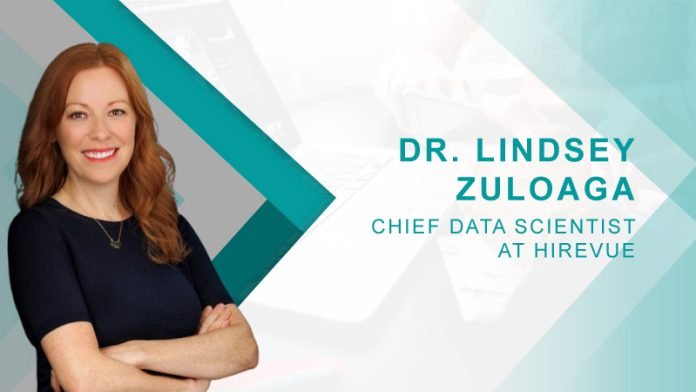Dr. Lindsey, we’re delighted to have you at HRTech Cube. Could you briefly share your professional journey and what led you to your role as Chief Data Scientist at HireVue?
I’m a first-generation college student, and I went on to receive a PhD in Applied Physics. While today there are entire programs built for a career in data science, they were few and far between when I started in school (and I honestly wouldn’t have known to look at them as an undergraduate).
After my postdoc, I decided to transition from academia to industry. It was a humbling experience; I was overqualified for many entry-level jobs, but under qualified from an experience standpoint because I’d never had an industry job before. After getting through the pains of hiring, I spent some time in healthcare, but transitioned to HireVue shortly after.
Survey results show that both candidates and HR leaders see AI as fair or even better than humans in hiring. How do you ensure HireVue’s AI tools maintain and enhance fairness?
Ensuring fairness is an ongoing part of being a leader in our industry and something my team focuses a tremendous amount of effort on in partnership with our teammates in industrial organizational psychology.
We’re fortunate that in our space there are clear metrics for fairness that we need to meet. HireVue employs a validated bias-mitigation process based on the EEOC’s Uniform Guidelines. Our work is also guided by the standards outlined in the Society for Industrial and Organizational Psychology’s (SIOP) “Principles for the Validation and Use of Personnel Selection Procedures,” and with the professional standards for the design of testing programs (e.g., American Educational Research Association, American Psychological Association, & National Council on Measurement in Education, 1999; Society for Industrial and Organizational Psychology, 2018).
Aside from the value that standardization and job-relatedness has in a hiring process, algorithms can be closely monitored and tuned to ignore certain factors that humans cannot ignore. We have seen time and time again these factors all lead to an increase in diverse hires.
What impact is AI having on the workplace, particularly on productivity and employee satisfaction?
According to our 2024 Global Guide to AI in Hiring, AI is significantly improving productivity, with 41% of HR professionals who use GenAI reporting they are more productive. We have seen firsthand how AI frees up time for HR professionals to focus on strategic tasks by automating repetitive tasks like resume screening and sending tactical candidate communications. The automation of these tasks is getting everyone to the most important task faster – making job offers.
On employee satisfaction, workers tend to appreciate AI when it’s used for routine tasks, such as interview preparation and resume building, which allows them to focus on more complex, fulfilling activities.
How have employers’ perceptions of AI in the workplace evolved with the advent of new AI tools?
Employers’ perceptions of AI have become increasingly positive. The majority of HR professionals (66%) now report a more favorable attitude toward AI compared to the previous year. They recognize that AI helps them get more done and enhances their productivity, with most already using or planning to use AI tools in the next year. HR professionals also trust AI systems to make candidate recommendations, with 39% expressing high trust in AI’s ability to recommend quality candidates.
How have workers’ views on AI at work changed, and what do you think is driving these changes?
Workers’ views on AI are evolving, driven largely by increased awareness and understanding of how algorithms work. Although workers are generally cautious about AI making final hiring decisions, they recognize its potential to reduce bias in hiring. About 49% of workers believe AI can help address unequal treatment in hiring, and 46% think AI can treat all job applicants more fairly than humans. Education around AI’s role and transparency about its use are key factors driving this shift in perception.
Looking ahead, what shifts do you foresee in AI’s integration into the workplace, and what challenges or innovations do you expect?
As AI continues to integrate into the workplace, we can expect more routine and administrative tasks to be automated, freeing up employees and HR professionals to focus on higher-value tasks. Innovations in transparency, bias mitigation, and explainability will continue to accelerate, with AI tools offering greater insights into their decision-making processes. One of the challenges ahead will be ensuring that AI systems comply with evolving regulations and industry standards, particularly around fairness and data privacy.
What best practices would you suggest for companies implementing AI in their workplace, especially in hiring?
Rigorous testing is the bedrock of any product strategy and every powerful tool should undergo testing before it’s deployed, as well as after. Vendors worth your team’s time and money should be able to demonstrate their fairness testing with externally audited and explainable processes – evidence of these includes publicly available 3rd party audit results and an AI Explainability Statement to demonstrate fairness.
What advice would you give companies on communicating transparency and building trust with candidates when using AI in hiring?
Transparency is key to building trust with candidates when using AI in hiring. Companies should communicate clearly and early about how AI is used, such as through welcome screens that explain how an AI system will evaluate candidates. Offering tools like HireVue’s Candidate Feedback Report, which provides AI-generated insights on areas where candidates excelled and where they can improve, can also help build trust by demonstrating how AI adds value.
With AI’s growing presence, especially tools like ChatGPT sometimes used without approval, what steps should HR leaders take to maintain ethics and compliance?
HR leaders should only use approved tools to ensure that anything used for high-stakes decision-making adheres to ethical guidelines and complies with legal requirements.
HR leaders should focus on selecting AI vendors that can demonstrate transparency, offer explainable AI processes, and conduct thorough audits to ensure compliance. Additionally, HR leaders should implement internal policies and corporate guidelines for the use of AI tools, especially those like ChatGPT, to maintain control over their use and mitigate any potential risks.
Finally, what are your thoughts on the future of AI in hiring? How do you see these tools evolving to better serve both candidates and organizations?
We’re going to see a complete and rapid change from a requisition-based approach to a multidimensional space of job discovery and opportunity matching where candidates own more of their profile and application data. One day we all look back in disbelief at the current approach that relies so heavily on job descriptions, resumes, and one-to-one applications.
I’m really excited about the potential for AI to create clearer career pathways for people. We have an assessment called Find My Fit where a candidate takes the test and it shows them all of the roles they’re suited for at a company as opposed to having them apply to a single requisition. The technical term for this is “skills-based job clusters.” That looks like referring teachers to training roles and solution architecture positions at SaaS companies
Explore HRTech News for the latest Tech Trends in Human Resources Technology.

Dr. Lindsey Zuloaga, Chief Data Scientist at HireVue
Dr. Lindsey Zuloaga is the Chief Data Scientist at HireVue, managing a team that builds and validates machine learning algorithms to predict job-related outcomes. As an academic researcher with a Ph.D. in Applied Physics, she has performed novel experiments and data analysis, resulting in scientific publications with applications in medicine, sensing, and signal processing. Lindsey started her data science career in the healthcare space, striving to improve the lives of people with chronic health conditions. At HireVue, she is working to completely transform traditional interviewing with a platform that focuses on understanding more of the candidate as a whole person, including interview responses, coding abilities, and cognitive skills as opposed to just the facts shown on a resume.












